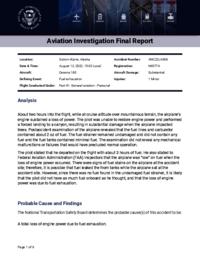
This information is added by users of ASN. Neither ASN nor the Flight Safety Foundation are responsible for the completeness or correctness of this information.
If you feel this information is incomplete or incorrect, you can submit corrected information.
| Date: | Friday 12 August 2022 |
| Time: | 16:02 LT |
| Type: |  Cessna 180 |
| Owner/operator: | Nafus Gifford William |
| Registration: | N6577A |
| MSN: | 32474 |
| Year of manufacture: | 1956 |
| Total airframe hrs: | 6066 hours |
| Engine model: | Continental O-470-50 |
| Fatalities: | Fatalities: 0 / Occupants: 1 |
| Other fatalities: | 0 |
| Aircraft damage: | Substantial |
| Category: | Accident |
| Location: | Sutton-Alpine, AK -
 United States of America United States of America
|
| Phase: | En route |
| Nature: | Private |
| Departure airport: | Wasilla, AK (0AK1) |
| Wasilla, AK (0AK1) | |
| Investigating agency: | NTSB |
| Confidence Rating: |
About two hours into the flight, while at cruise altitude over mountainous terrain, the airplane's engine sustained a loss of power. The pilot was unable to restore engine power and performed a forced landing to a canyon, resulting in substantial damage when the airplane impacted trees. Postaccident examination of the airplane revealed that the fuel lines and carburetor contained about 2 oz of fuel. The fuel strainer remained undamaged and did not contain any fuel and the fuel tanks contained minimal fuel. The examination did not reveal any mechanical malfunctions or failures that would have precluded normal operation.
The pilot stated that he departed on the flight with about 3 hours of fuel. He also stated to Federal Aviation Administration (FAA) inspectors that the airplane was 'lowâ on fuel when the loss of engine power occurred. There were signs of fuel stains on the airplane at the accident site; therefore, it is possible that fuel leaked the from tanks while the airplane sat at the accident site. However, since there was no fuel found in the undamaged fuel strainer, it is likely that the pilot did not have as much fuel onboard as he thought, and that the loss of engine power was due to fuel exhaustion.
Probable Cause: A total loss of engine power due to fuel exhaustion.
Accident investigation:
 |
|
Sources:
NTSB ANC22LA068
Location
Revision history:
| Date/time | Contributor | Updates |
|---|---|---|
| 01-Jul-2024 08:04 | ASN Update Bot | Added |
Corrections or additions? ... Edit this accident description
The Aviation Safety Network is an exclusive service provided by:


 ©2024 Flight Safety Foundation
©2024 Flight Safety Foundation